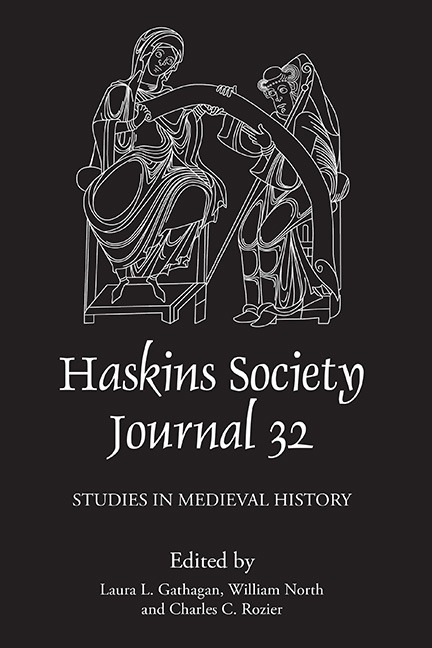Book contents
- Frontmatter
- Contents
- List of Illustrations
- Editors’ Note
- Abbreviations
- 1 Nearly-Not Miracles of the Carolingian Era: A Hypothesis
- 2 Noble Fathers and Low-Status Daughters in the Eleventh Century: Rilint, libera, and Hiltigund, presbyterissa
- 3 The Norman Conquest of England, the Papacy, and the Papal Banner
- 4 Ostmen, Normans, or Norwegians? Names and Identities in the Irish Sea World c. 1100
- 5 The Origins of Administrative Lordship in Medieval Flanders: A Reassessment
- 6 Multiple Allegiance and Its Impact: England and Normandy, 1066–c. 1204
- 7 The Wiley Lecture: Monsters in Anglo-Norman Historiography; Two Notes on William of Newburgh’s Revenants
- 8 A Female King or a Good Wife and a Great Mother? Seals, Coins, and the Epitaphic Legacy of the Empress Matilda
- 9 Harangue or Homily? Walter Espec, Deuteronomy, and the Renewal of the Covenant in Aelred of Rievaulx’s Relatio de Standardo
- 10 Anger Management: Modeling Christian Kingship in Peter of Blois’s Dialogus
- 11 In His Name: Religion as Administrative Strategy in Thirteenth-Century Champagne (and Navarre?)
- 12 Warhorse Markets and Social Status of Combatants under Edward I of England, 1296–1307
5 - The Origins of Administrative Lordship in Medieval Flanders: A Reassessment
Published online by Cambridge University Press: 19 May 2022
- Frontmatter
- Contents
- List of Illustrations
- Editors’ Note
- Abbreviations
- 1 Nearly-Not Miracles of the Carolingian Era: A Hypothesis
- 2 Noble Fathers and Low-Status Daughters in the Eleventh Century: Rilint, libera, and Hiltigund, presbyterissa
- 3 The Norman Conquest of England, the Papacy, and the Papal Banner
- 4 Ostmen, Normans, or Norwegians? Names and Identities in the Irish Sea World c. 1100
- 5 The Origins of Administrative Lordship in Medieval Flanders: A Reassessment
- 6 Multiple Allegiance and Its Impact: England and Normandy, 1066–c. 1204
- 7 The Wiley Lecture: Monsters in Anglo-Norman Historiography; Two Notes on William of Newburgh’s Revenants
- 8 A Female King or a Good Wife and a Great Mother? Seals, Coins, and the Epitaphic Legacy of the Empress Matilda
- 9 Harangue or Homily? Walter Espec, Deuteronomy, and the Renewal of the Covenant in Aelred of Rievaulx’s Relatio de Standardo
- 10 Anger Management: Modeling Christian Kingship in Peter of Blois’s Dialogus
- 11 In His Name: Religion as Administrative Strategy in Thirteenth-Century Champagne (and Navarre?)
- 12 Warhorse Markets and Social Status of Combatants under Edward I of England, 1296–1307
Summary
The county of Flanders enjoys the reputation of being a rich, powerful, and especially well-governed principality, best compared with ducal Normandy or even kingdoms such as England and Capetian France. It is therefore puzzling to observe that the most recent comprehensive study on the development of Flanders’ institutions dates back to the 1830s, when the distinguished German legal historian Leopold August Warnkönig published his monumental Flandrische Staats- und Rechtsgeschichte. An updated overview was provided by another legal historian, François-Louis Ganshof, in a seminal chapter of the Histoire des institutions françaises au Moyen Âge, but this was now more than sixty years ago. A renewed framing of Flemish governmental and administrative development through the high Middle Ages is required; it should be supported by a full reexamination of primary evidence and a more open engagement with issues of pragmatic literacy. This is not to say that the historiography on Flanders is lacking, of course. Much has been written before and after Ganshof's milestone account, with regular attention to key institutional matters, yet extant scholarship appears siloed and unbalanced.
The comital chancery and the related charter production have received enduring attention from the Ghent school, from Henri Pirenne to current scholars such as Thérèse de Hemptinne, Georges Declercq, and Els De Paermentier. Impeccable critical editions of all comital charters ranging from 1071 to 1206 are now available, coupled with in-depth studies on the chancery (and the office of ‘chancellor of Flanders’) up to the mid-thirteenth century. A second area that has received considerable attention, especially in the wake of post-Second World War enthusiasm for economic history,is comital finance and financial administration. However, this line of inquiry has been largely left aside for the last fifty years. It is unfortunate, for financial activities obviously fueled administrative innovation in Flanders. On the level of local government, early scholarly efforts were devoted to the various representatives of the counts, such as castellans and bailiffs and, in later studies, to the decentralized judicial and feudal organization. By contrast, other major aspects of Flemish governance have largely escaped scrutiny so far. For instance, we do not have a single study on the comital court (curia comitis) – the central structure of princely government well up to the late twelfth century – despite ample evidence in the witness lists of comital charters.
- Type
- Chapter
- Information
- Publisher: Boydell & BrewerPrint publication year: 2021

